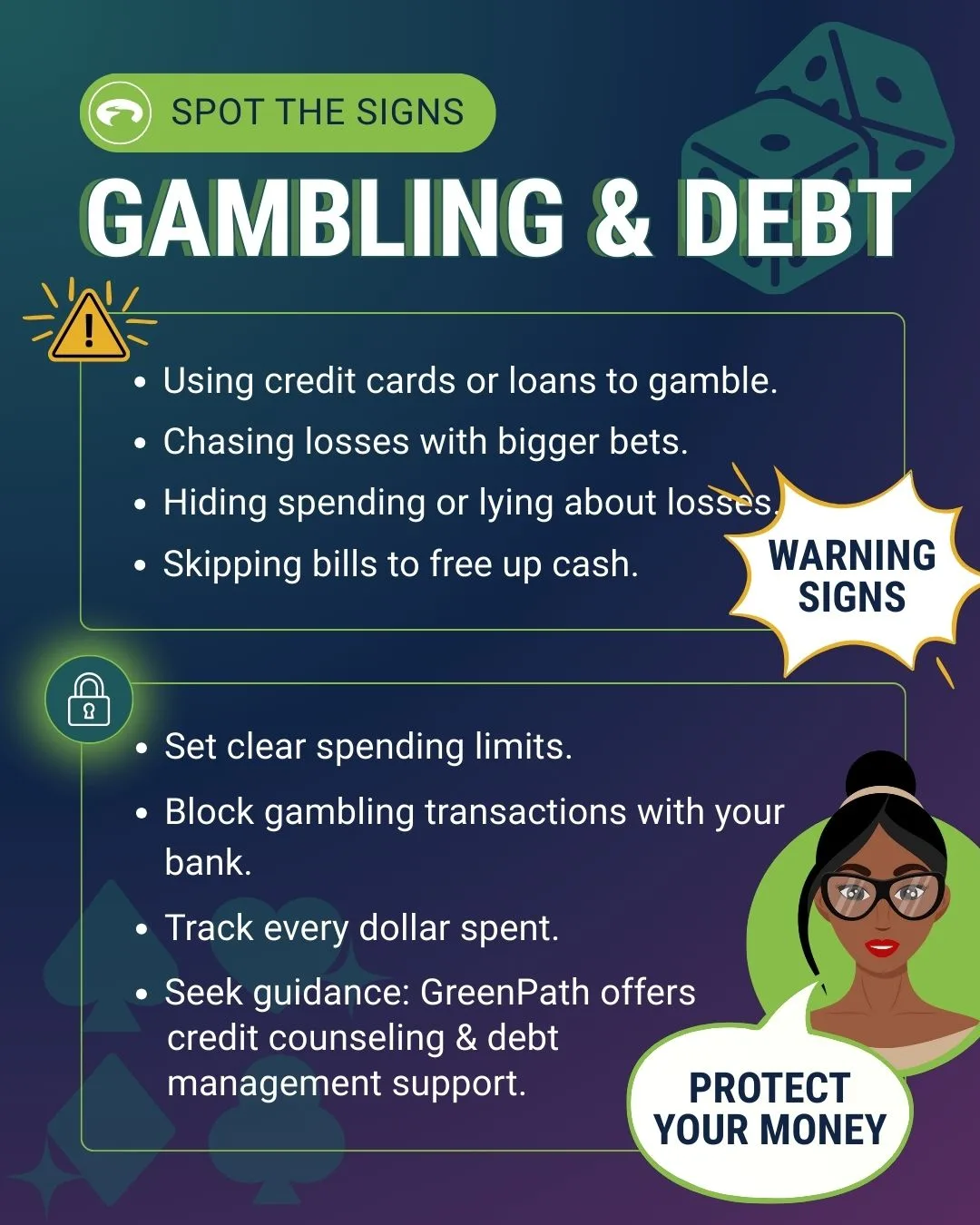Online gambling can quickly shift from harmless fun to serious financial stress if spending gets out of control.
Recognizing the warning signs early—like hiding losses or using credit cards to gamble—can help you protect your financial health.
If gambling-related debt has piled up, a Debt Management ProgramDebt Management Program may help you lower interest rates, reduce payments, and regain stability.
The Rise of Online Gambling—and Why It Matters for Your Wallet
Imagine having money you’d set aside for retirement or emergencies quietly, steadily siphoned off—not by big purchases, but by bets made from the comfort of your couch.
A study from Kellogg Insight shows that when online sports betting becomes legal in a state, many households pull money from their savings and long-term investments to fund wagers. It turns out the gamble often isn’t just what you put down tonight—it’s what you’ll lose later in financial security.
Online gambling has exploded in recent years. From betting apps to online casinos, it’s easier than ever to wager a few dollars—or a few hundred—without ever leaving home. For some, it’s light entertainment. For others, though, those quick clicks add up to late-night stress, mounting bills, and a debt cycle that feels impossible to escape.
If you’ve found yourself refreshing your betting app instead of your budget, you’re not alone. But spotting the red flags—and knowing your options—can make a difference.
The Connection Between Gambling and Debt
At its core, gambling thrives on uncertainty. While the chance of winning can be exciting, the odds are rarely in the player’s favor. Over time, this reality can drain savings, max out credit cards, and even create long-term financial hardship.
More than half of U.S. credit card borrowers—60% to be exact—carry debt from month to month, according to the Federal Reserve Bank of New York. Add gambling charges to already high-interest balances, and the path to repayment gets even steeper.
What makes online gambling particularly risky is its accessibility. You don’t have to plan a trip to a casino—you just need your phone, a credit card, and a few spare minutes. The combination of ease and anonymity can quietly push you deeper into debt before you realize what’s happening.
Warning Signs Your Gambling May Be Impacting Your Finances
Not sure if your gambling has shifted from a casual hobby to a potential problem? Spotting the warning signs early is the best way to prevent long-term financial stress and protect your money.
1. Relying on credit cards or loans to gamble
If you’re borrowing money to place bets—whether through credit cards, payday loans, or personal loans—gambling debt can spiral out of control quickly. Interest charges make the debt grow even faster, leaving you paying far more than you ever won.
2. Chasing losses with more gambling
Trying to “win back” money after a loss often leads to bigger losses. This cycle of chasing losses is one of the most common signs of problem gambling and can drain your savings or lead to significant debt.
3. Hiding gambling expenses or lying about losses
If you find yourself downplaying how much you’ve spent or hiding your gambling activity from family or friends, it may be because you already sense it’s straining your finances. Secrecy is a red flag that the habit may be harmful.
4. Skipping bills or daily essentials to fund gambling
When paying rent, utilities, groceries, or other necessities takes a backseat to gambling, it’s a sign that the behavior is interfering with financial stability. Neglecting bills not only risks your financial health, but it can also damage your credit score and long-term security.
Ways to Protect Your Money (and Yourself)
If you’re worried that gambling is creating debt or financial stress, the good news is that there are practical steps you can take to protect your finances and regain control.
- Set Clear Spending Limits
Use a budget worksheetbudget worksheet, app, or even simple cash envelopes to put firm limits on how much you’ll spend on entertainment—including gambling. Treat this amount as non-negotiable. Once it’s gone, the game is over. Setting limits creates structure and helps you avoid overspending. - Block Gambling Transactions
Many banks and credit card providers now offer tools to block gambling-related transactions. Turning on these safeguards can help you remove temptation before it drains your account, making it easier to stick to your financial goals. - Track Every Dollar You Spend
Gambling losses often add up faster than people realize—especially when bets are small but frequent. Keep a detailed log of your spending to see the full picture. Tracking helps you stay accountable and can be an eye-opener if you’ve been underestimating your losses. - Consider Professional Debt Support
If gambling debt is already weighing you down, professional help can make a big difference. A certified credit counselor can review your situation and help you explore solutions. A Debt Management Program (DMP)Debt Management Program (DMP) may lower your monthly payments, reduce high interest rates, and create a realistic path to becoming debt-free. GreenPath clients find that with support, a debt-free future actually feels possible.
When Gambling Debt Feels Overwhelming
Something to keep in mind: gambling-related financial stress doesn’t define you. Debt is something you have, not something you are.
Taking even one small step—whether that’s setting a spending limit, having an honest conversation with someone you trust, or talking with a certified financial counselor—can lighten the load.
Entertainment should never come at the cost of your financial future. And if gambling-related debt has taken control, GreenPath is here to help you chart a healthier, more stable path.
You Might Also Be Interested In…
What You Will Learn
- Strategies to reduce financial stress
- Tips for navigating difficult conversations around money
- Ways to improve your relationship with money

GreenPath Financial Service
Debt Management Program
GreenPath is a 60-year trusted national nonprofit, learn how GreenPath’s Debt Management Program can help you pay off your debt in 3-5 years, while helping you develop sound financial literacy.










